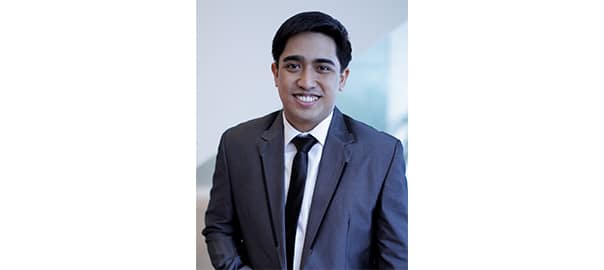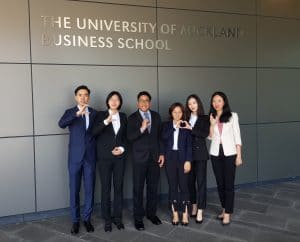Adrian Cenon is a Master’s student and MikesBikes Mentor from The University of Auckland. He was also recently invited by Audrea Warner, professor at the Graduate School of Management to share his experience using MikesBikes Advanced in the Managing People and Organizations course. We thought it would be a great idea for Adrian to share his experience with all of you.
Get to know Adrian more in our interview below as he shares his MikesBikes experience, the challenges and lessons he learned from the simulation.
Tell us about yourself
Adrian: I’m currently a Master of Management, major in International Business student at The University of Auckland. I have finished a degree in Economics and Education, major in History at De La Salle University.
I have worked in Singapore as an Organizational Development Analyst and as a Global Learning Support Executive. In addition, I was also a Training and Research Officer.
What was your first impression about using a business simulation in the course?
Adrian: I was impressed that my first course in University of Auckland recognized that learning is enhanced by connecting the management theories discussed in class with the dynamic interactions within a team. As well as how they respond to real-life challenges and scenarios incorporated in MikesBikes. Through my previous work experience, I have been an advocate of the 70-20-10 model (by Eichenger and Lombardo) that has been widely used by management consultants and talent development professionals.
Furthermore, I heard a lot of feedback from the previous Cohort that the MikesBikes experience will be a challenging, fun and effective way to enhance my business acumen and leadership skills.
Did your impression of the simulation change as the course progressed?
Adrian: Yes, the whole learning journey was more immersive and challenging than what I expected. The level of competition among teams was intense and it required a lot of effort and focus to adapt our strategies based on market trends so we could gain an edge. I also didn’t expect that it would elicit extreme levels of happiness, excitement and sometimes disappointment as you view the results after each rollover.
How was your experience working on the simulation on your own and eventually with a team?
Adrian: I would say that MikesBikes engaged my team on a level where we felt that we were running our own company and were accountable for our roles. When I reflect on the experience, I am extremely proud of how our team performed because of four reasons:
- We were genuinely passionate about our brand – WindChaser, and how it stood for “Chasing the Right Things” – identifying what is important and chasing it with the best of our abilities. Everyone participated in formulating our Team Goals and Key Performance Indicators (KPIs) and strategies.
- We had a great team culture and believed in the capabilities of one another. The rigor of analysing various reports (eg. Marketing, Finance, Manufacturing, Research and Development and Human Resources), making decisions, and competing with other teams strengthened our realization that we could only achieve our goals if we functioned as a high performing team. We learned to foster interdependence by aligning our actions with our core values of Passion, Accountability, Respect and Trust.
- Third, we dealt with conflicting priorities the right way and demonstrated integrity in how we competed with the other teams. Our team was aware of numerous “strategies” that we could pursue to get ahead and maximise our Shareholder Value (SHV) at all costs. But just like in the real world, you are sometimes faced with a choice to focus on the bottom line or preserve your reputation and relationship with others.
For example, heading to the final rollover, we had the option of extracting as much capital from our partner firm/ subsidiary. The problem was that applying this tactic would hurt their final SHV. Instead of taking full advantage, our team agreed to a reasonable rate with our subsidiary to ensure a sustainable SHV growth for both teams. In the end, this decision came at the expense of our team losing the European market by a narrow margin. However, we didn’t treat this as a setback because we stayed true to our values and enhanced our reputation and credibility among our peers.
4. Even though we didn’t win our market, we believed that the MikesBikes experience brought out the best in each one of us. As the CEO, I learned the importance of empowering your team members to perform their roles but at the same time providing guidance and support when they experience challenging situations. I am grateful to my team for believing in my capabilities and trusting me that we would become better individuals as a result of this learning journey.
Please share your experience in the course as a whole and how the simulation added value and impacted your learning.
Adrian: I consider MikesBikes as an effective platform that maximised the learning from the “Managing People and Organisations” course. The different scenarios and complexities provided various opportunities. I was able to utilise my previous work experience and theories I learned in class, and apply them in a simulated business environment.
The experience took me out of my comfort zone as it brought a lot of high and low points which required me to reflect and adapt to changes to effectively lead my team. I consider the lessons learned from the simulation and the course as vital “Deep Smarts” which I would be able to leverage when I continue my career in Organizational Development and Talent Management.
What advice would you give your past self (go back to the time when you were still doing the course and the simulation)? What do you wish you knew back then when you were doing the simulation?
Adrian: I would prefer not to give my past self any advice about the course and the simulation. I believe that the process of dealing with uncertainty provided the best opportunity to learn and more importantly, build character. There were several instances where our team spent a lot of time in figuring out how to drive our strategies because we recognized that a wrong move can have significant consequences. Ultimately, the ability to handle pressure, evaluate the effectiveness of decisions, and manage our mindset proved to be excellent learning points which are applicable in the real world.
Connect with Adrian through LinkedIn.



